List of mosques in China
This is a list of notable mosques in China. A mosque is a place of worship for followers of the religion of Islam. The first mosque in China was the Huaisheng Mosque in Guangzhou, built during the Tang Dynasty in 627 CE. In of 2014 there were 39,135 mosques in China,[1][2] 25,000 of these are in Xinjiang, a north-west autonomous region, having a high density of one mosque per 500 muslims.[3]
| Part of a series on Islam in China |
|---|
.jpg.webp) |
|
|
In China, mosques are called Qīng Zhēn Sì (清真寺, "Pure truth temple"), a name which was also used by Chinese Jews for synagogues. Other names include Huí Huí Táng (回回堂, "Hui people's hall"), Huí Huí Sì (回回寺, "Hui people's temple"), Lǐ Bài Sì (礼拜寺, "Temple of worship"), Zhēn Jiào Sì (真教寺, "True teaching temple") or Qīng Jìng Sì (清净寺, "Pure and clean temple").[4][5]
During the Qing Dynasty, at the Mosque entrance of Hui Mosques, a tablet was placed upon which "Huáng Dì Wàn Suì, Wàn Suì, Wàn Wàn Suì" (皇帝萬歲,萬歲,萬萬歲) was inscribed, which means, "The Emperor, may he live forever". Wansui means Ten thousand years, which means forever in Chinese.[6] Westerners traveling in China noted the presence of these tablets at mosques in Yunnan and Ningbo.[7][8][9]
Most mosques have certain aspects in common with each other however as with other regions Chinese Islamic architecture reflects the local architecture in its style. China is renowned for its beautiful mosques, which resemble temples. However, in western China the mosques resemble those of Iran and Central Asia, with tall, slender minarets, curvy arches and dome shaped roofs, as well as the unique multi-layered portals. In northwest China where the Chinese Hui have built their mosques, there is a combination of eastern and western styles. The mosques have flared Buddhist style roofs set in walled courtyards entered through archways with miniature domes and minarets.[10]
The style of architecture of Hui Mosques varies according to their sect. The traditionalist Gedimu Hanafi Sunnis, influenced by Chinese culture, build Mosques which look like Chinese temples. The reformist modernist (but originally Wahhabi inspired) Yihewani build their Mosques to look like Middle Eastern Arab style Mosques.
List of mosques
References
 This article incorporates text from The Chinese repository, Volume 13, a publication from 1844, now in the public domain in the United States.
This article incorporates text from The Chinese repository, Volume 13, a publication from 1844, now in the public domain in the United States. This article incorporates text from The Chinese repository, Volumes 11-15, a publication from 1842, now in the public domain in the United States.
This article incorporates text from The Chinese repository, Volumes 11-15, a publication from 1842, now in the public domain in the United States.
- "Strengthen and promote the standardization of mosque management" (in Chinese). CPPCC News. 2014-12-18. Archived from the original on 2015-02-22. Retrieved 2015-02-22.
- "2015最新中国清真寺数量及分布". www.chinaislam.net.cn. Retrieved 2021-01-11.
- "The amount of mosques in Xinjiang is increasing to near 25,000" (in Chinese). Chinese Youth Daily. 2009-07-17. Retrieved 2015-02-22.
- Shoujiang Mi, Jia You (2004). Islam in China. 五洲传播出版社. p. 29. ISBN 7-5085-0533-6. Retrieved 2011-05-16.
- The Chinese repository, Volume 13. Printed for the proprietors. 1844. p. 31. Retrieved 2011-05-08.
- Broomhall 1910, p. 290.
- The Chinese repository, Volumes 11-15. Printed for the proprietors. 1842. p. 33. Retrieved 2010-06-28.
- Michael Dillon (1999). China's Muslim Hui community: migration, settlement and sects. Richmond: Curzon Press. p. 77. ISBN 0-7007-1026-4. Retrieved 2010-06-28.
- Hagras, Hamada (2017). "An Ancient Mosque in Ningbo, China "Historical and Architectural Study"". Journal of Islamic Architecture. 4 (3): 102–113. doi:10.18860/jia.v4i3.3851.
- Saudi Aramco World, July/August 1985 , page 3035
- "存档副本". Archived from the original on 2007-08-14. Retrieved 2006-10-15.
- "存档副本". Archived from the original on 2007-10-04. Retrieved 2006-10-15.
- "存档副本". Archived from the original on 2006-09-25. Retrieved 2006-10-15.
- http://news.xinhuanet.com/english/2009-04/09/content_11159058.htm
- "存档副本". Archived from the original on 2006-09-25. Retrieved 2006-10-15.
- "存档副本". Archived from the original on 2006-11-11. Retrieved 2006-10-15.
External links
| Wikimedia Commons has media related to Mosques in China. |
- Mosques in China, a gallery at the site of the Institute for Research and Studies of Muslim Minorities (IRSMM)
- Islamic Architecture in Xinjiang
- Islamic Architecture in Xinjiang
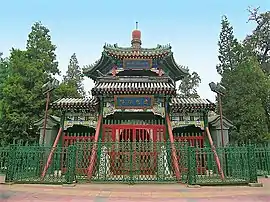
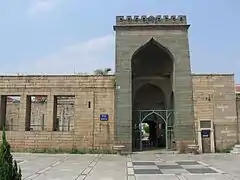
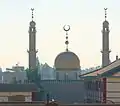
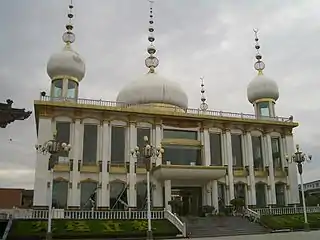




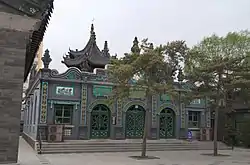
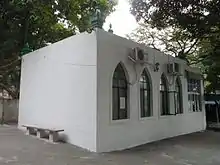


.JPG.webp)
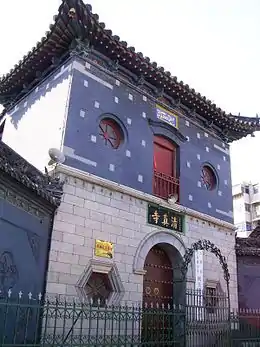


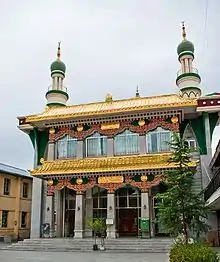
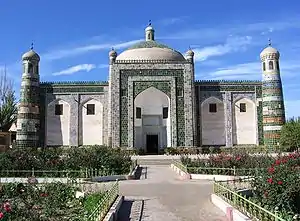
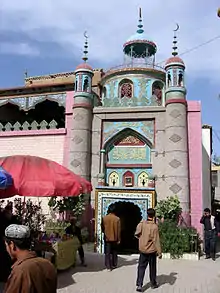
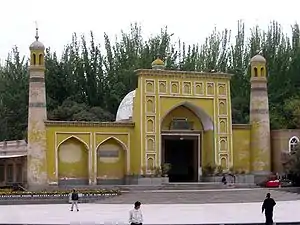

.jpeg.webp)